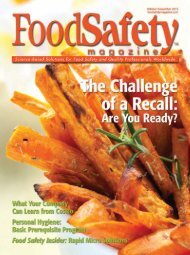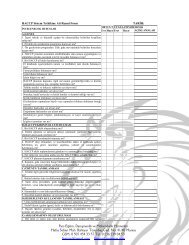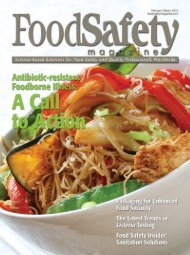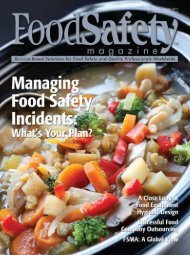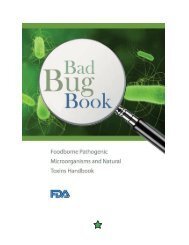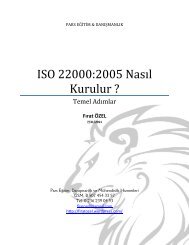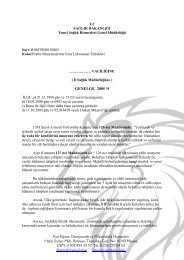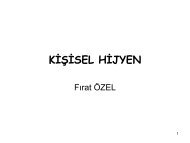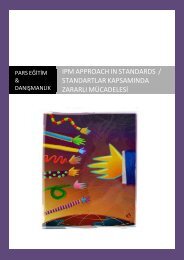AccreditationBy Mohan Sabaratnam and Patrick McCullenThe Role of AccreditationBodies in Supply Chain RiskManagementAccreditation helps managerisk throughout the foodindustryFrom production to distribution, the complexcrop-to-table food supply chain is fraught withrisk, as demonstrated by recent outbreaks offood-related diseases such as bovine spongiformencephalopathy-infected beef, Listeria andSalmonella.Representatives from Danone, a French foodproducts corporation, and WalMart summarized thechallenges facing the food industry at the Global <strong>Food</strong><strong>Safety</strong> Initiative (GFSI) 2012 conference on “AdvancingGlobal <strong>Food</strong> <strong>Safety</strong> through Collaboration.” FrankYiannas, vice president of food safety at WalMart, said,“In a changing food delivery system, food production,processing, distribution, retail, foodservice and transportationall have a shared responsibility to providesafe food.”Yves Rey, quality general manager at Danone,added, “Today’s consumer not only expects value formoney but also demands that companies act responsiblytowards the community. Each time there is a foodsafety incident, besides the human tragedy, there is aloss of confidence in our food supply.”All food organizations, retail conglomerations andregulatory agencies look to food testing laboratoriesto ensure that biological and chemical components offoods are safe for consumers. But are all food testinglaboratories created equal?The short answer is no. Certainly,food testing laboratories are required tomeet ISO/IEC standard 17025:2005,General requirements for the competence oftesting and calibration laboratories. However,the devil is in the details. In thecase of food testing laboratories, bestpractices dictate that a third party assessthe competency of the testing lab and itscompliance with the relevant standards—and that’s where accreditation bodies(ABs) come into play.The ABCs of ABsABs are responsible for ensuringcompliance with standards, examiningthe competence of laboratory staff,verifying accredited scopes of testing/calibration and monitoring effectivenessof laboratory quality managementsystems. Third-party ABs can accreditcertification bodies, inspection agencies,calibration/testing laboratories and otherconformity assessment bodies. They arerequired to operate in accordance withISO/IEC 1701, General requirements foraccreditation bodies accrediting conformityassessment bodies. In general, an accreditedcertification body primarily providescertification to a quality managementsystem (e.g., ISO 9001, ISO 14001, ISO22000, etc.), whereas an accredited testing/calibrationfacility provides an accuratestatement of measurement usuallyin a test report or calibration certificate.The U.S. <strong>Food</strong> and Drug Administration(FDA) has concluded that certificationbodies should have access to competentlaboratory services needed to supporttheir food safety audit program functions.These laboratories should conformto ISO/IEC 17025:2005.As not all testing/calibration laboratoriesperform the same work or havesimilar capabilities, accreditation canhelp identify and qualify those that arecompetent to perform a defined scopeof work. Further, accreditation requirestraceability to the SI units of measure-24 F o o d S a f e t y M a g a z i n e
Accreditationment undertaken by the laboratory, providinga high degree of reliability to itsmeasurements. Accreditation is a formal,independent process that ensures laboratoriesmeet established management,quality and technical standards and arecompetent to perform the services forcustomers and stakeholders within theirrecognized scope of accreditation.<strong>Food</strong> testing laboratories depend onABs to perform thorough assessmentsand to provide timely feedback for improvementsbased on the AB’s findings.For instance, Melissa Calicchia, ownerof <strong>Food</strong> Microbiological Laboratories,based in Cypress, CA, is a State ofCalifornia (ELAP) and ISO/IEC 17025microbiological food testing laboratoryaccredited by International AccreditationService Inc. (IAS), based in Whittier, CA.Calicchia says, “I chose to earn accreditationbecause it demonstrates that our laboperates to a global standard with rigorousexamination of methods, facilitiesand staff.”Analytica Alimentaria GMBH, anindependent laboratory also accreditedunder IAS with laboratories in Germanyand Spain, specializes in the analysis ofpesticide residues and other potentialfood contaminants. Udo Lampe, generalmanager for Analytica Alimentaria, adds,“Accreditation by a neutral and technicallycapable organization is the onlyway to confirm that our laboratory meetsthe technical requirements for testingand that we fulfill our own qualitysystem.”Standards of EvaluationThe process of becoming accreditedand maintaining accreditation involvesongoing technical and quality assessmentsof a laboratory’s equipment,personnel qualifications and methods/procedures used for performing calibration/testingand can vary from countryto country. In the U.S., for example,expanding regulatory oversight willdictate advances in these standards (see“Anticipated Regulatory Changes Pushfor Accreditation Standards,” p. 26).Accreditation in the U.S. is complexand highly sector specific. As a result, theU.S. has multiple ABs, some of whichspecialize to serve certain industries.When selecting an accredited calibrationor testing laboratory to test your productsor calibrate your equipment, makesure that the AB is a signatory memberof the International Laboratory AccreditationCooperation (ILAC) Mutual RecognitionArrangement (MRA). ILAC is a• ATP Monitoring - 15 seconds• Enterobacteriaceae - 8 hours• Coliform - 8 hours or less• E. coli - 8 hours or less• NEW! Total Viable Count - 7 hours• NEW! Listeria - 16 hours• Allergen Prevention - 15 secondsFREEMENTION THIS ADCALL: 1.888.HYGIENAwww.hygiena.cominfo@hygiena.comglobally recognized international cooperationof laboratory and inspection ABs.These member ABs participate in a rigorouspeer evaluation process based ona common standard (ISO/IEC 17011)to ensure that each signatory maintainscompetence to provide accreditationservices. The result of this MRA is thatthe reports of laboratories accredited bySAVINGS CODE: <strong>2013</strong>FSF e b r u a r y • M a r c h 2 0 1 3 25
- Page 4 and 5: February/March 2013Vol. 19, No. 1FE
- Page 6: Editor’s LetterWe at Food Safety
- Page 10 and 11: USDA Seeks Comments on ProposedFroz
- Page 12: TestingBy Katerina Mastovska, Ph.D.
- Page 15 and 16: Testingheat treatment, the toxins c
- Page 17 and 18: staying connectedto your data hasne
- Page 19 and 20: PROCESS CONTROL1. Scope2. Normative
- Page 21 and 22: SANITATIONapproach, 1, 2 while effe
- Page 23: SANITATIONis a matter of legal liab
- Page 27 and 28: AccreditationFood Microbiological L
- Page 29 and 30: MANAGEMENTcertain spices. As no acc
- Page 31 and 32: MANAGEMENTtook so long to be resolv
- Page 33 and 34: Choose ConfidenceChoose Confidence
- Page 35 and 36: Special advertising supplement pres
- Page 37 and 38: AccuracyQualitySafetyHACCP Monitori
- Page 39 and 40: THE SANITARY CHOICEFOR FOOD SAFETYT
- Page 41 and 42: Specialists in Food & BeverageSampl
- Page 44 and 45: PACKAGING(continued from page 34)fo
- Page 46 and 47: Animal Welfareand Food SafetyBy F.
- Page 48 and 49: Animals versus PlantsBefore discuss
- Page 50 and 51: Percent (between 0 to 1) / $100 spe
- Page 52 and 53: Despite developments in traceabilit
- Page 54 and 55: INGREDIENTSBy Rupa Das, M.Sc.Qualit
- Page 56 and 57: SEAFOODBy Gary P. Richards, Ph.D.,
- Page 58 and 59: SEAFOODfoods is essential to reduci
- Page 60 and 61: SEAFOOD(infectious and noninfectiou
- Page 62 and 63: Product ShowcaseShelf-Life Extender
- Page 64 and 65: Coupler BrakeForce Control Industri
- Page 66 and 67: Advertisers IndexAdvanced Instrumen
- Page 68 and 69: Allergens LabeledSanitation Verifie
- Page 70 and 71: Solutions for Today,Planning for To
- Page 72 and 73: keynote theatre special events2013
- Page 74 and 75:
WORKSHOPS • TUESDAY, APRIL 30WORK
- Page 76 and 77:
Sessions • WednESDAY, May 1SESSIO
- Page 78 and 79:
Sessions • WednESDAY, May 1SESSIO
- Page 80 and 81:
Sessions • ThurSDAY, May 2SESSION
- Page 82 and 83:
Exhibit hall — where solutions ar
- Page 84:
155 N. Pfingsten Rd., Suite 205Deer



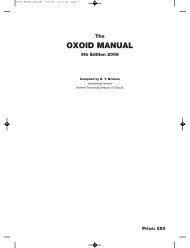
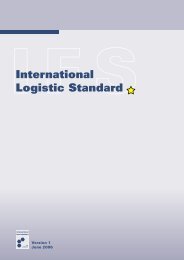
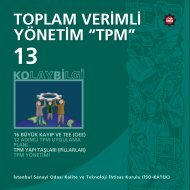
![Otomatik indirilmez ise tıklayınız [Download]](https://img.yumpu.com/44170525/1/190x190/otomatik-indirilmez-ise-taklayanaz-download.jpg?quality=85)
